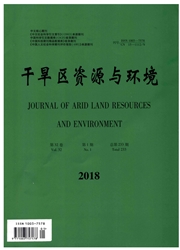

 中文摘要:
中文摘要:
我国尚处于转轨经济时期.市场体系建设不完善.尤其是在广大农村地区.正式制度的建设和发展相对滞后.社会资本在农村社会经济中的作用更加突出。鉴于此.本文基于Putnam的社会资本理论.以农村农业废弃物资源化为例.基于其“集体行动”与“利他主义”属性.应用Tobit模型系统分析了3个层面的社会资本的核心要素(信任、互惠规范、公民参与网络)对农民环境保护投资意愿的影响冲击。研究结果表明:(1)农业废弃物资源化得到了多数农民的认同.68.3%的受访农民对农业废弃物资源化具有投资意愿.且意愿投资水平为8.46-12.39元/月;(2)社会资本变量中对农民环保投资意愿的贡献度大小排序依次是制度信任〉公民参与网络〉人际信任〉互惠规范;(3)人力资本中的文化程度、物质资本中的家庭纯收入、控制变量中的是否兼业、是否为村干部对农民环保投资意愿均表现出积极的作用;(4)要缩小私人投资与社会最优投资之间的差距.实现农业废弃物资源化利用在经济效益、环境效益上的统一需要政府或宏观经济管理者在制度安排上向其倾斜:通过强化政策支持或舆论引导提升农村的社会资本水平.增进农民对“信任互助”、“团队合作”的认知;完善环境保护相关法律法规.做到有法可依、执法必严、违法必究.改变民众对法规持有的“法不责众”态度;大力发展农村地区的基础教育.提高农村地区人们的文化教育水平。
 英文摘要:
英文摘要:
China is still in economic transition period, and its market economy is imperfect, and especially in rural areas, the construction of the formal system and development is relatively backward and the role of social capital in rural social economy becomes prominent. Therefore, on the basis of Putnam's social capital theory, this paper employed Tobit model and systematically analyzed three micro core factors of social capital ( institutional trust, norm of reciprocity, and citizen participation in networks) that affect farmers' willingness of environmental protection investment, by taking farmers in rural areas reusing agricultural wastes as an example. Based on disscussion of control variables of human capital and physical capital factors, we prove that social capital do significantly affect the degree of farmers' willingness to pay for reusing agricultural waste. Results show that : ① most of farmers agree with reusing agricultural wastes. About 68.3% respondents are willing to invest reusing agricultural wastes and they intend to invest 8.46 to 12.39 RMB per month. ② The roles of various dimensions of social capital are different in driving the degree of farmers' willingness to pay and they can be sorted from high to low as follows: institutional trust 〉 citizen participation in networks 〉 interpersonal trust 〉 norms of reciprocity. ③ Education level ( human capital ) , family net income ( physical capital ) , by-business and village officials ( control variable) can enhance the degree of farmers' willingness to pay for reusing agricultural waste. ④ In order to reduce the gap between private investment and social optimal investment and to realize the unification between the economic and environmental benefits of agricultural waste resource, governments and macroeconomic managers need taking some actions. First, farmers' perception of mutual trust and teamwork need to be strengthened by policy support and public opinion guide to raise the level of social capital in rur
 同期刊论文项目
同期刊论文项目
 同项目期刊论文
同项目期刊论文
 期刊信息
期刊信息
